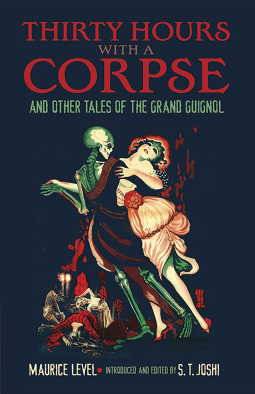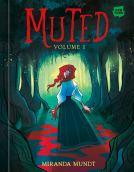
Thirty Hours with a Corpse
and Other Tales of the Grand Guignol
by Maurice Level
This title was previously available on NetGalley and is now archived.
Send NetGalley books directly to your Kindle or Kindle app
1
To read on a Kindle or Kindle app, please add kindle@netgalley.com as an approved email address to receive files in your Amazon account. Click here for step-by-step instructions.
2
Also find your Kindle email address within your Amazon account, and enter it here.
Pub Date Mar 15 2016 | Archive Date May 31 2016
Description
Thirty-nine conte cruel ("cruel tales") include "In the Light of the Red Lamp," in which a husband's photographs of his dead wife reveal a deeper tragedy; "Fascination," the tale of a morbid passion that develops when the narrator, determined to stay at home, shoots his mistress for the sake of peace and quiet; and "The Bastard," concerning a father's suspicions about his son's paternity. Other stories include "The Taint," a view of infanticide as mercy-killing; "The Test," in which an accused murderer is forced to reenact his crime; and "A Maniac," recounting a thrill-seeker's ghoulish impulse to witness death-defying stunts gone wrong.
Available Editions
| EDITION | Paperback |
| ISBN | 9780486802329 |
| PRICE | $9.95 (USD) |
Featured Reviews
 Renee G, Reviewer
Renee G, Reviewer
I enjoyed these tales. My favorite was The Last Kiss they say love is blind. I will be reading these again.
 Trina P, Reviewer
Trina P, Reviewer
An enjoyable collection of stories. There were a few duds, but the good outweighed the bad. I will be looking for other books by this author.
 Reviewer 224449
Reviewer 224449
I had never heard of Maurice Level before, but I am glad I got the opportunity to read this book. Level writes short stories that have endings that really know how to twist the knife. I appreciated that the stories focused not on the supernatural, but on the more everyday horrors. Some of the stories did feel like riffs on the same topic, but overall, I enjoyed this collection.
 E V, Reviewer
E V, Reviewer
Thirty Hours with a Corpse is a collection of short stories written by Maurice Level for the Grand Guignol in Paris. These are tales of passions gone awry—of sorrow, obsession, regret, and deceit— with strong notes of idealism sounding within their depths. Although they are considered horror, they are not the same type of horror of which we are accustomed. Tight, clever, and sometimes ironic, the characters are driven by compulsions from which they shed or regain their humanity. Some also served to vicariously cleanse me of any revenge fantasy; others would have fit in the old “The Twilight Zone” television series. Read within their historical, literary or theatrical context makes them even more enjoyable. Vive la Pousette!
 Rowan M, Reviewer
Rowan M, Reviewer
3.5 STARS I think anyone who considers themselves a fan or especially a writer of mystery/thriller/suspense/horror should read this book. Not every story is a gem (one in particular made me flat-out angry, as a modern-day person with a disability) but they are all a fascinating look into the genre's history. Many of the Grand Guignol twists seem obvious because they've developed into tropes over the decades, but when you keep in mind that the style was new when these were written, the delightful shiver that they were written to inspire comes right back.
 Althea M, Book Trade Professional
Althea M, Book Trade Professional
A very interesting anthology of short stories by this prolific and largely overlooked French author. These are probably best read in small doses, rather than one after the other in large chunks, due to a certain similarity in structure that becomes obvious after a while (the horrific 'twist'!) - but they're definitely enjoyable as entertainment, as well as being a fascinating glimpse into the concerns and attitudes of the average French citizen of the times.
The Debt Collector • (1920) • (trans. of L'encaisseur 1910)
Ten years at a bank have established our protagonist as a model employee. So he counts on getting a light sentence after turning himself in for having 'lost' the funds entrusted to him. He's got a scheme... but not all works out quite as planned.
The Kennel • (1920)
A jealous husband is ruthless when the body of a neighbor is found in his unloving wife's bedroom. (Note to self: regard anyone who keeps vicious animals with suspicious caution.)
Who? • (1920)
It's passing strange that a chance-met stranger resembles the face a doctor has imagined as that of the skull that adorns his study. But it may be more than mere coincidence.
Illusion • (1920) • (trans. of Illusion... 1910)
A destitute beggar encounters one even more unfortunate than himself: a beggar who is blind. Moved by the blind man's plight, and unseen, for one evening he poses as a wealthy benefactor. Although it has its touch of horror, overall this is a touching and meaningful story about the good in humanity, rather than the evil.
In the Light of the Red Lamp • (1909) • (trans. of Sous la lumière rouge 1906)
Fragile with grief, a widower asks his friend to accompany him while he develops the last, postmortem photograph of his deceased wife. In the darkroom, he discovers something terrible.
A Mistake • (1920)
Should a doctor be held responsible for decisions resulting from a faulty diagnosis? One patient thinks so! (But the decisions were really, really horrible.)
Extenuating Circumstances • (1920) • (trans. of Circonstances atténuantes 1910)
I still fail to understand why people 'stick by' family members who have committed the most horrible crimes. But they still do, just as the mother in this story stands by her son.
The Confession • (1920)
On his deathbed, a prosecutor confesses that for years, he's been convinced that the man he sent to the gallows was actually innocent. He's been weltering in guilt. But, as in most of these short stories, there's a twist at the end.
The Test • (1920)
Will being confronted with a corpse cause a suspect who loudly proclaims his innocence to change his tune?
Poussette • (1920)
Religious fervor and a horror of the more carnal aspects of life have often been connected. However, one elderly, solitary woman extends her expectations of chastity to her pet cat - and she is doomed to be sorely disappointed.
The Father • (1920) • (trans. of Le père 1910)
Almost a precursor to the daytime talk show here... On her deathbed, a mother leaves her son a letter in which is contained a startling revelation. It's up to him what he chooses to do with the information.
"For Nothing" • (1920)
After growing up in a single-parent household, and enduring the shame and deprivation of poverty, a man finally, as a last resort, appeals to his wealthy father. The man has never acknowledged him, and he doesn't really expect him to. He makes a rash decision based on that expectation - which turns out to be a terrible mistake.
In the Wheat • (1920)
Malicious gossip sparks a peasant farmer's suspicions regarding the behavior of his wife toward their landlord - with drastic results.
The Beggar • (1920) • (trans. of Le mendiant 1910)
Cautionary tale: when a family turned away and threatened the beggar who roused them from sleep; little did they know that he bore an urgent appeal for help from their son. If only they had listened...
Under Chloroform • (1920)
Would you rather put your life in the hands of someone who knows and loves you? Or in the hands of a cool and professional stranger?
The Man Who Lay Asleep • (1920)
Fresh from jail, a career criminal is eager to resume his life of mayhem and violence. Sneaking into a random family's home with a knife at the ready, he's got murder on his mind. But little does he know whose house he's broken into...
Fascination • (1920) • (trans. of Fascination 1910)
Arguably over-dramatic, this short tale is a very remarkably accurate elucidation of the horror of that strange human urge to do the most drastic and irrevocable things we can imagine - even if we have no particular desire to do them.
The Bastard • (1920)
When a father becomes convinced that his beloved small son is not actually his child, he loses his mind - and tragedy results.
That Scoundrel Miron • (1920)
After falling into debt, an artist flees and creates a new identity in order to escape the arm of the law. Many years later, when he believes his old identity must be long-forgotten, he ventures back into art, using a new name. But the first gallery owner he encounters remembers the vanished Miron - and compares his new work favorably. Upon which, Miron freaks out. I found this one unconvincing, psychologically.
The Taint • (1920)
Huh. Who knew that something like epilepsy used to be considered such a shameful thing, on a level with how mental illness was viewed?
The Kiss • (1920) • (trans. of Le baiser 1910)
Dying of a self-inflicted wound, a lovelorn young man makes a sentimental final connection with the nun tending to his bedside.
A Maniac • (1920) • (trans. of Un maniaque 1910)
Night after night, a bloodthirsty spectator attends a daredevil show, hoping to see the performer have a terrible accident. The performer might just assume he has a devoted fan...
The 10:50 Express • (1920) • (trans. of Le rapide de 10 h. 50 1910)
The trauma of a train conductor who was on duty during a terrible accident.
Blue Eyes • (1919) • (trans. of " Mes yeux " 1904)
Barely recovered from a long illness, a young woman convinces the doctor to release her from hospital so that she can commemorate the anniversary of her lover's death. But all is not as sweet as it seems: her lover was executed for the crime of murder. Still, the penniless, ailing woman is willing to do just about anything to be able to buy flowers to place on his grave.
The Empty House • (1920) • (trans. of La maison vide 1910)
A nervous burglar has an unexpected encounter within the house he's ransacking. The story has a certain weakness I've encountered in other writing from around this time period: (view spoiler)
The Last Kiss • (1920)
Why would a man who'd been horribly disfigured with acid by his own wife, go to court and plead for her acquittal? His only request is that, when released, she come to visit him, alone. And then, we discover his reason.
Under Ether • (1918)
During WWI, a doctor is bound to treat any injured person - even an enemy soldier. From opposite sides of the conflict, the two men profess respect for one another. But on the operating table, a contradictory truth may be revealed.
The Spirit of Alsace • (1918)
A small village sends all of its able-bodied men off to fight in WWI. Practically as soon as they leave, the invaders march in, demanding supplies - and information. An elderly shopkeeper turns 'traitor' - or does he?
At the Movies • (1918)
Since her husband went 'missing' at the front, a woman has presumed herself to be a widow. After all, what other explanation could there be for having no word for over two years? She regales her small son with tales of his absent hero father. But when they go to see a documentary newsreel about life on the battlefield, an unpleasant revelation is discovered.
The Little Soldier • (1918)
On a date, a soldier recuperating from a wound tells his admirer war stories and behaves with gallantry. But although he's survived the battlefield, he's not out of danger yet. Very sentimental.
The Great Scene • (1918)
A playwright is frustrated that his star actor simply refuses to play a dramatic scene with the passion he intended. But real life tragedy doesn't always result in histrionics.
After the War • (1918)
Playing up to anti-German sentiment, for sure... but a wonderfully cynical look at the limits of good intentions. The German officer billeted in the homes of French citizens states loudly that he only believes in doing what War makes necessary, and in not causing any more difficulty for civilians than in unavoidable. But will he make sure that what he preaches is practiced?
The Appalling Gift • (1923)
Ah-hah-hah-hah! This one is hilarious! And somehow, not 'dated' at all. Some things never change... An elderly relative gifts a couple who pride themselves on their impeccable taste with an enormous and hideous decorative vase. Their efforts to avoid insulting the giver gradually increase...
Night and Silence • (1922)
A trio of disabled siblings, hampered by their problems, come to grief. This grotesque tale puts the issues faced by the blind men and the elephant to shame!
The Cripple • (1933)
How cruel must a man be to only begrudgingly pay a farmhand the settlement granted him by the courts, when, after a terrible on-the-job accident, he's lost the use of his hands? How dare he doubt the man's disability and suffering? How terrible must it be to be crippled, unable to even help those around you in an emergency? Well... here's a cynical answer.
The Look • (1933) • (trans. of Le Regard 1906)
Having developed a secret passion for another man's wife, a doctor has found himself in the odd position of having become a close associate of the husband. He's there when a terrible accident happens one day, and finds himself in the position of having his rival's life in his hands.
The Horror on the Night Express • (1934)
In a train compartment, strangers often get to talking to one another during a long journey. One young woman is full of gossip about the latest outrage to hit the tabloids: the unsolved murder of a woman. Her husband is strangely loath to talk about the news. But by chance, one of the other men on the train was actually an investigator assigned to the case... and the information he reveals will lead to a dramatic act.
Thirty Hours with a Corpse • (1934)
A farcical tragedy. Two young men are in their rented apartment with the body of a recently-killed young woman. Together, they plan to escape and leave town before the death is discovered. But events conspire to stop them: first they're not allowed to vacate the premises because they're behind on their rent, then the boyfriend of the dead woman shows up looking for... one thing after another. Will they make their getaway? And why did she end up dead, after all? A bit more in-depth and developed than most of the short tales in this volume.
She Thought of Everything • (1935)
No longer in love with her husband, and eager to be with her secret lover, a wife carefully plots to kill her husband. But will 'thinking of everything' mean that her scheme will proceed as planned?
Many thanks to NetGalley and Dover for the opportunity to read this collection. As always, my opinions are solely my own.
Awesome collection of dark/ horror fiction. Unnerving and lingering with superb cover art. a nice release.
 Nicola M, Reviewer
Nicola M, Reviewer
3.5/5
A collection of every Maurice Level story translated into English (except one). This is a hodge-podge of stories and not all are by any means macabre or suspenseful but they all do have the shocking or at least unexpected ending. As described in the introduction, each of these stories can be considered a one-act play. They are all short and in fact, were produced as plays for the Grand Guignol. Level always wrote his plays as a short story first and then from that adapted it into a play. None of his plays were ever published. My enjoyment of the stories was mixed, with my ratings ranging from 1 to 5 stars but averaged out to a solid 3.5.
Introduction - Excellent introduction to the author's life (of which little is known), a discussion of his work and influences, and information on the collection. These are all Level's stories which have been translated into English excepting one which is so mainstream "its inclusion could not be justified". The dates given are from the first English publication; the stories come from two books containing collections and the last several appeared in magazines.
1. The Debt Collector (1920) - A devoted long-time employee, absconds with a large amount of money, secures it with a lawyer who will return the package upon mention of a name. The man then gives himself up to the police, spends five years in prison, goes off to collect his stolen money and cannot remember the name. Trying to recall it drives him to madness. (3/5)
2. The Kennel (1920) - A man on a rural estate finds his marriage, not the joyous passionate one he had imagined. One night alone in his room he gets up to visit his kennel of dogs and sees the light go off in his wife's room. There he finds a young man who appears asleep on the couch in her rooms. What ensues is tension filled and devious. (4/5)
3. Who? (1920) - A doctor works late one night and a skull he has on a shelf appears to suddenly form flesh and stare at him as a living person; the vision disappears. Then the doctor has a very unnerving experience. A good build up of suspense! (4/5)
4. Illusion (1920) - A beggar thinks about what he would do were he rich, then he meets a blind beggar and finds the richness in helping those less fortunate than yourself. Nice ... but it has a twist ending! (4/5)
5. In the Light of the Red Lamp (1920) - I'm not quite sure I get this one but a man is in a dark room developing the deathbed photograph of his beloved wife. (3/5)
6. A Mistake (1920) - A doctor is faced with a patient he diagnosed a year prior. This is a perfect example of the"one-act" stories Level writes. Predictable, though. (3/5)
7. Extenuating Circumstances (1920) - A mother sacrifices herself for the misdeeds of her son. Readable but boring. (2/5)
8. The Confession (1920) - The narrator is called to the deathbed of a prosecuting attorney, whom he does not recognise or seem to know. The man then proceeds to tell him he must make a confession to him. Very good build-up and surprising end. (5/5)
9. The Test (1920) - A man is brought before the corpse of a woman he is accused of murdering. He denies knowing her even though there are witnesses. The magistrate is questioning him about his obvious guilt. This has a great build-up but the ending is just plain silly. (2/5)
10. Poussette (1920) - An old maid, a devout Catholic, is obsessed with sins of the flesh. She is a virgin and has a beloved cat, that she has kept virginal as well. One night the cat escapes and the woman goes mad that it has been possessed by the Devil. A bit silly rather than freaky. (3/5)
11. The Father (1920) - Upon his mother's death a young man receive's a letter from her, revealing her secrets. He has a choice to make. The tension is how he will react at the end but this is more of a morality tale than weird or mysterious like the others. I liked it well enough, though. (3/5)
12. "For Nothing" (1920) - A man is accused of murder and will not tell the court how or why he did it. Then he finally gives his confession. The title "for nothing" can be applied to the story in several ways. Good build up but with the overdramatic ending that one can expect from this time period. (5/5)
13. In the Wheat (1920) - While working in the field with a scythe, an old woman convinces the man that his wife and master are having an affair. Pretty straightforward with an abrupt ending. (2/5)
14. The Beggar (1920) - Everybody basically gets what they deserve in this. A man is pushing a horse past his endurance to get a loaded waggon up a hill. The driver calls for the help of a beggar nearby but the horse can't do it and the waggon tips over. Trying to get help, the beggar finds he is treated as usual, less than human. More of a morality tale than anything else. (2/5)
15. Under Chloroform (1920) - Fifty years later a doctor tells a story at a gathering of the time he administered the chloroform to a patient who was the married woman he was having a passionate affair with. (3/5)
16. The Man Who Lay Asleep (1920) - A man just out of jail walks to Paris with murder in his heart. Now growing very hungry he finds a little house with no lights on looking for food. The owner (a large hulking man) comes home and he hides in a wardrobe; as the hours pass it gradually dawns on him just where the terrible place is that he has come to rest. A mounting terror throughout the story makes this a good read. (4/5)
17. Fascination (1920) - A man just acquitted of murder feels he must write out what really happened, as he is quite guilty. The man has always had these little compelling urges but never acted upon them before. This one is marvellous; you know what is coming but it is so suspenseful. (5/5)
18. The Bastard (1920) - Wow, this one is intense. A man comes home furious because he has finally succumbed to the village gossip that his wife is having an affair and has been since before they were married. Now he questions who is the father of their son with disastrous results. (5/5)
19. That Scoundrel Miron (1920) - This is quite a different calibre than the other stories. It's not "weird" or suspenseful but a sad little tale of an artist who finds out, by destroying his life, that he is revered much more "dead" than he ever was while actively painting. But then he also finds that later in life, he becomes a better painter than he ever was, only he cannot bring himself to compete with the name of his younger same. (5/5)
20. The Taint (1920) - I suppose this would be a scary or haunting fear of parents back in the early years of the 20th century, but read today it is simply a sad tale. A pregnant woman finds out her husband is epileptic (a terrifying condition back then) and the hubby dies. After she gives birth all she can think of is both the disease and madness that runs in his family, thus, she kills the baby of which she is terrified. (1/5)
21. The Kiss (1920) - A man is in the hospital for shooting himself when the prostitute he loves dumps him. He is tended to by a nursing nun and as the man's madness turns to death, we learn why the woman become a nun. Overdramatic. (2/5)
22. A Maniac (1920) - A man is obsessed by accidents of pure chance. He visits the opera every night waiting for it to have a fire. He visits the zoo every day waiting for the lion to maul its handler. Then both occur after ten years. Now having nothing to do he is purposeless until he sees the signs in town that a cyclist will perform a death-defying stunt on a type of roller coaster track for the next three months. The end was inevitable but this was a good read. (3/5)
23. The 10:50 Express (1920) - A "cripple" tells a man the story of how he was paralysed in a train accident. Fast-paced reading as we hear the thoughts of a quadriplegic in the middle of onrushing danger. (4/5)
24. Blue Eyes (1920) - This is a dark atmospheric story that gives you a little shiver at the end. An emaciated young woman who is in the hospital and only been up a few days pleads to leave for just the next day, as it is All Soul's day and she must leave flowers on the grave of her lover who has been dead less than a year. We learn she is/was a prostitute and her man was executed, being destitute she is frantic to get some flowers. (5/5)
25. The Empty House (1920) - A thief enters a house he knows to be empty. He's looking for cash and financial documents rather than silver. He feels a strange sense of apprehension when first entering the house, but as a pro at this line of work he falls back into ease. Except what he meets, later on, is the last thing he'd expected. Good mounting terror. (5/5)
26. The Last Kiss (1920) - A man has a last talk with his lover who threw acid in his face blinding and scarring him. Tense. (4/5)
27. Under Ether (1918) - A French doctor operates on a German soldier during the war. Nothing happens, just a short dealing with the humanity of those involved in war. (3/5)
28. The Spirit of Alsace (1918) - So the Prussians take over a village that the French troops have just been through. They command a Prussian draper to lead them where the troops went and drag the mayor along. The mayor constantly harangues the draper as a traitor, but there is a twist ending, Not bad for what it was. (3/5)
29. At the Movies (1918) - A wife believes her husband fell with the first troop to die. Watching a newsreel at the movies she answers her son's questions about his dad that is, until she has a shock. (3/5)
30. The Little Soldier (1918) - A young soldier, a corporal, and a girl meet in a storm and she learns of his life history and injury in the war. He manages to get her home and later she learns she's met a true, "officer and a gentleman". Well written, but I'm not particularly finding these war stories entertaining. (3/5)
31. The Great Scene (1918) - A famous actor can't get an emotional scene right saying he must save it for the audience. When the night comes he doesn't deliver as expected and we learn why. Another so-so war story. (3/5)
32. After the War (1918) - Just some talk between German soldiers showing how they talk and act are different. Showing their brutality. (1/5)
33. The Appalling Gift (1923) - Anyone can relate to this. An aunt sends a couple a hideous vase. They decide to hide it and only bring it out when she visits. The aunt ends up with the last word. Funny! (4/5)
34. Night and Silence (1932) - Now this is freaky! The best story here. Three siblings: a cripple, a blind man, and a deaf mute. The cripple dies and the other two put her in a coffin and sit vigil with her for the night. One man can only see, the other can hear and speak, they can't communicate to each other when the terrible thing that happens after the candles have gone out. (5/5)
35. The Cripple (1933) - A man is injured in a threshing machine and can't use his hands. The courts have said the farmer must continue to pay him his weekly wages. The man has a dilemma when a young washerwoman falls into the river. A good twist ending. (4/5)
36. The Look (1933) - A man goes to visit his newly wed friend and meet the wife. They've just recently got married but she was his mistress for two years prior. They only married when she was free to. There is a cloud over the house's atmosphere, the wife leaves the men be and the adulterer tells his friend the whole story of the misery they find themselves in. Good gothic feel. (4/5)
37. The Horror on the Night Express (1934) - A murder mystery is being discussed in a train car. The woman is fascinated and one man turns out to be the medical examiner for the case. He tells them a new clue that will positively ID the murderer will be revealed in the papers tomorrow. Then horror happens. Delightful! (5/5)
38. Thirty Hours with a Corpse (1934) - Finally the titular story and it is a tour de force! In the grand style of Poe, this story deals with the unbearable guilt of the main characters. Two men stand staring at the dead woman in their rooms, decide to put her in a trunk and from there everything goes wrong as they try to escape. We don't find out how she died until the end. (5/5)
39. She Thought of Everything (1935) - One evening at supper a woman decides to kill her husband. Then over the next few months, she plans it all. Has a whopper of an ending. I'd been expecting the same end results but not the way they unfolded. A perfect story to end the collection with. (5/5)
 Victoria I, Media/Journalist
Victoria I, Media/Journalist
For those that love tales of corpses, intrigue, and bloody Grand Guignol fashion, the collection Thirty Hours with a Corpse collects the important work of Maurice LEvel and gives them to a public that previously did not have access.
Unless you could read fluent French, these stories were kept away. Now in English, readers have a chance to experience the magic of Level's writing. For those who love intrigue and horror, this is the collection you must have. Even better, this is published through Dover, making it an affordable option and not something that you can only afford by reading it in the reference nook of your local library.
Readers who liked this book also liked:
Yushi Kawata, Yukito
Comics, Graphic Novels, Manga, Entertainment & Pop Culture, Humor & Satire


















